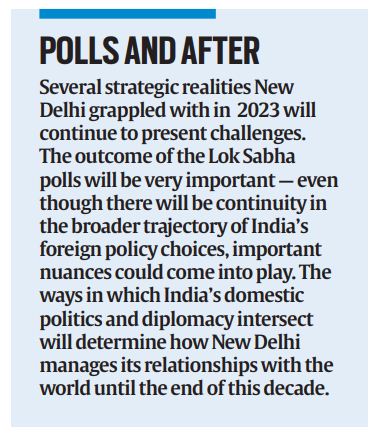Strategy and Foreign Affairs for India in 2024: Dealing with Reality and Seeking Opportunities

In 2022, Prime Minister Narendra Modi told President Vladimir Putin that “this is not the era of war.” However, 2023 has become a year of war: the fighting between Russia and Ukraine may soon enter its third year, and the ongoing war in the Gaza Strip, sparked by the Hamas attack on October 7, is among the most destructive conflicts in recent decades.
Looking to the future, other conflicts around the world pose clear challenges. China’s belligerence has not subsided even as its economy shows some signs of difficulty – something that worries the West and India.
2023: Strategic realities
1. The crisis in the Middle East: Two years of efforts to normalize relations between Israel and the Arab world were disrupted by the Hamas attack, which resulted in the deaths of more than 1,200 civilians and military personnel, and the taking of more than 230 hostages.
Israel’s angry and disproportionate response has led to the deaths of more than 20,000 Palestinians in Gaza so far – drawing criticism even from the United States. The Israeli-Arab reconciliation process is currently off track, and Gaza’s future is unknown.
2. Tension in Indo-American relations: After the successful visits of Prime Minister Modi and President Joe Biden to each other’s capitals, bilateral relations are facing headwinds over allegations of an Indian official’s link to an assassination plot against a Khalistani separatist in the US.

India’s response was different from the way it responded to Canada when it suggested an Indian government connection to the killing of another Khalistani in that country. The Prime Minister expressed India’s “commitment to the rule of law” and promised to “look into” the role of Indian citizens in the alleged US plot if information is provided.
3. War fatigue between Russia and Ukraine: As the war continues, the West faces financing challenges. Ukraine hopes to obtain 18.5 billion euros from the European Union and more than $8 billion from the US package, which also includes vital military aid. But aid remains blocked – by Republicans in the US Congress, and by Hungary in the European Union – until now.
On the other hand, Putin’s re-election as president of Russia is a foregone conclusion. The Russian economy has remained resilient despite the sanctions, and the proximity between Moscow and Beijing is worrying the West.
4. Maldives Challenge in India: The government of President Mohamed Moiso, who led the “India Quit” campaign to power, has asked India to withdraw its military personnel stationed in the Maldives and has expressed its intention to terminate the water survey agreement. Muizzu Foundation is considered close to China.
5. China, the biggest concern: China remains the greatest concern and strategic challenge facing India. The border standoff has entered its fourth winter, maintaining a force posture to rival China’s military presence. Adding to the concern is the dependence of Moscow, India’s strategic defense partner, on Beijing for economic survival, and the Maldives’ proximity to China in the Indian Ocean.
6. G20, Global Positioning in the South: India’s success in negotiating a joint declaration at the G20 summit came as a surprise to many in the international community. One of the most important lessons learned from the G20 process was New Delhi’s mobilization of developing and least developed countries under the umbrella of the Global South. The idea of leading the Global South is seen as taking forward the legacy of India’s leadership of the Non-Aligned Movement, which has only been adapted to the 21st century.
7. Towards participation in Kabul: There has been a change of guard at the Afghan embassy in New Delhi, with the current ambassador leaving and that country’s diplomats in Mumbai and Hyderabad taking charge. To India’s relief, they have confirmed that they will not raise the Taliban flag or use Taliban names in their official correspondence.
However, India is dealing with the Taliban, as a technical team has been deployed at the embassy in Kabul, and the current team at the Afghan embassy in New Delhi is coordinating with the regime to provide passport and visa services to Afghan citizens. China has sent a full-time envoy to Kabul.
 Domestic politics can play a role in India’s foreign policy decisions.
Domestic politics can play a role in India’s foreign policy decisions.
2024: Challenges and opportunities
The results of the Lok Sabha elections will be of great importance to India’s strategic and foreign political situation.
If the NDA returns with a similar or stronger mandate, India’s positions on most global issues and relations will remain consistent – and may become clearer and stronger. If the mandate is weaker, the coalition government’s motives may be reflected in foreign policy as well.
But whatever the mandate, there will remain continuity in the broader trajectory of India’s foreign policy choices – despite some obvious nuances.
1. Relations between the United States and Canada: The challenge is to resolve the situation resulting from the “assassination plot” in the United States. Biden’s non-attendance at the Republic Day celebrations may have caused some discomfort in New Delhi, and the Quad summit had to be postponed to a later date, but neither India nor the United States, which are deeply invested in each other, want relations to be negatively affected.
Meanwhile, Canada’s allegations have cast a shadow over the relationship. While New Delhi rolled back its visa restrictions, Indian public opinion was in favor of the government, and even its worst critics did not criticize the response to the Canadian allegation. Dealing with the United States will not be the same as dealing with Canada, and New Delhi will not bring them together.
2. The new government in Pakistan: Since 2019, when the Indian government was re-elected and constitutional changes were implemented in Jammu and Kashmir, relations with Pakistan have been at their lowest point. The changing of the guard in Islamabad and Rawalpindi did not make any significant difference, and India remained committed to the principle of indifference in dealing with Pakistan.
Elections are now scheduled to be held in Pakistan, and it is possible that a new government will be formed there after February. Once the Lok Sabha polls are over, an opportunity may arise to resume participation. Whether that will happen remains to be seen.
3. Result in Bangladesh: Bilateral relations have gained positive momentum during the last 15 years of Sheikh Hasina’s government, and New Delhi will be keen to see it return to power in elections scheduled for early in the new year. Security imperatives guide India’s choice in Dhaka; The Bangladeshi opposition is viewed with suspicion and hostility, according to the record of Khaleda Zia’s government in the early 2000s. India is also looking forward to taking efforts to improve connectivity between its northeast and Bangladesh to a high level, which will benefit the region and both countries.
4. The continuation of the impasse with China: The ongoing border standoff since 2020 may feature in the election campaign, and any new escalation will affect the security environment and internal political climate in India. New Delhi will be more cautious in its response to the challenge posed by its biggest opponent in an election year. This imperative will form the framework of India’s diplomacy in dealing with China in the next few months, and even later.
5. Finding a way forward in West Asia: The conflict has tested India’s position over the past two months and has evolved over the course of this period. From early support for Israel to its positioning and balancing act with Palestine to the ceasefire call in the recent vote at the UN, India’s diplomatic stance has followed an arc closely watched by many in the global South. The Global South did not take kindly to India’s initial support for Israel, and the defeat by Pakistan in the vote for UNESCO’s vice-president was a reality check.
The conflict between Israel and Hamas may be coming to an end. The United States and the rest of the West are describing their initial unconditional support for Benjamin Netanyahu’s actions, and moving toward greater sympathy with the people of Gaza. This is an important moment in the conflict, as more thought is given to its ending, and what comes next.
6. The future of the war in Ukraine: The Russia-Ukraine war was also a test of India’s position. Russian oil imports have been a key component of India’s efforts to keep domestic prices low, especially ahead of the elections. But pressure from the US prevented India from giving Moscow carte blanche – this was the second year that the annual India-Russia leaders-level summit did not take place, and the next best opportunity will arise at the BRICS summit in Russia. Next year. Meanwhile, the war continues – and may inevitably head toward an uneasy truce.
7. Trade agreements and technical partnerships with the West: Free trade agreements with the UK and European partners are said to be at a critical stage. Elections to the EU Parliament, and possibly the UK, are scheduled to take place next year – shrinking the political space and flexibility available to negotiators. However, 2024 may see these major economic diplomacy initiatives come closer to fruition.
Dialogues with the US and EU on technology and trade, to remove barriers to India’s access to advanced technology in artificial intelligence, quantum computing, and cybersecurity, will be a relevant policy space to explore.
Tomorrow: Technology in 2024








